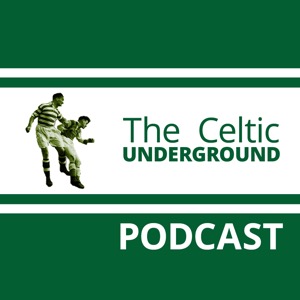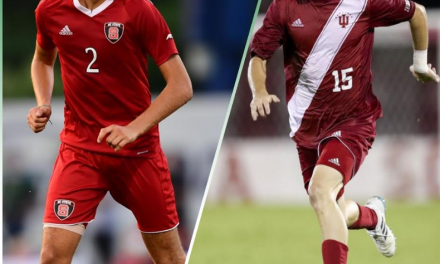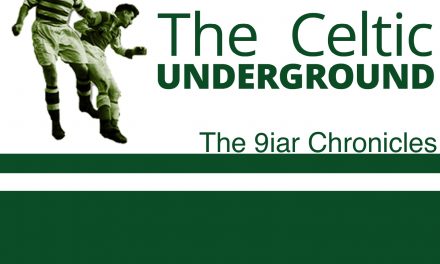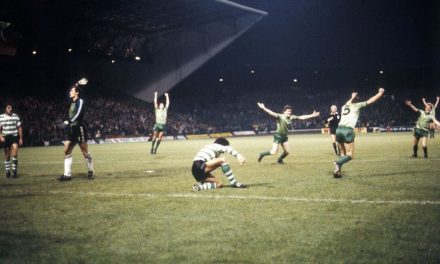What’s your first memory of Celtic as a boy?
The first memory I have of being at Celtic Park as a boy, I actually wasn’t supporting Celtic, but my home town team Dumbarton given my family’s house was a stone’s throw from Boghead. My Dad took me up to Parkhead for this game which I believe was a Southern League fixture in September 1943 and I think Dumbarton won 4-1. Dumbarton had a great inside left then called Willie Reid who scored that day and went onto manage St Mirren. My Dad also used to watch the Vale Juniors as he came from Alexandria, but years later he came to some Celtic games with me. I was with him at Firhill in 1969 when very sadly he died just inside the ground. That was Tommy Callaghan’s first ever game for Celtic. I was a great admirer of big Jock, and when he became manager my brother John and I started following Celtic home and away for years, and hardly ever missed a game.
Did you have a favourite player?
In the very early 1950’s, I used to love watching big John McPhail. I remember seeing him when Celtic played Lazio. Celtic won and big ‘Hooky’ scored 2 or 3. John played anywhere. He could play right or left half, centre half, inside forward or as a centre forward and he scored some great goals. He scored the goal against Motherwell which gave us the cup in 1951. He was a nice big guy, and I was very fortunate to have been able to play several times with him in the reserves, and twice with his brother Billy in the first team.
How did you get to Celtic?
It’s like everything else, you just start playing as a boy with the school team and then the Boys Guild team. I played juvenile for Vale Emmett and then the junior side, Duntocher Hibs asked me to sign. In 1953 I was asked up to Parkhead to meet Jimmy McGrory for the first time and I signed for Celtic there and then. I got 6 shillings and six pence (about 32.5p) per game at Duntocher Hibs which was good pocket money just for playing football. Eventually at Celtic I was to get £7 a week playing in the reserves and £9 a week when I was in the first team, which wasn’t bad money for that time.
What was Celtic like at that time?
I was there five years although the first year I was only provisionally signed. Then for season 1954-55 I was called up although I was still serving my time as a draughtsman. When I first went there the trainer was George Paterson, who had played in the 1938 Empire Exhibition cup winning team. In the first year I would train one night a week as a provisional player and at the end of it you were given a cup of tea and a pie, but the players were charged sixpence for it. Eventually a few of the guys refused to pay, so this was stopped. I used to go up there then go home without having anything to eat or drink at all. But that was the way all clubs were back then; it was just the way it was.
You made your debut against Partick Thistle in 1955. What do you remember about that day?
My first two games were against Thistle and Hibs. I played against Thistle’s Johnny McKenzie who was their outside right and a Scottish international at the time. He was the nicest person ever. During the game I must have done something right for he came over to me and said ‘Well done Peter, keep it up son.’ This was during the game and you wouldn’t get that now. Next game I played was against the famous five at Easter road and Gordon Smith was outside right and I was left back against him.
What was your best position?
I was initially a right half with Duntocher before I got moved to right back to let the Duntocher captain, Willie Bone, play there. I was playing right back for Celtic and one day we were playing Rangers reserves at Parkhead. Willie Waddell was playing at outside left. He was nearing the end of his career although he was still playing for Scotland. I was having a good game against him so he moved across to outside right. I was quite confident and I asked Hughie Fletcher, who was our left back, to move over because I wanted to follow Waddell. I must have done okay then because they started playing me at left back and that’s where I made my debut.#
What was it like at Celtic in those days?
The ground was completely different from what it is today. There were no coverings on the terraces – no floodlights, only a 60 watt bulb at either end of the main stand, so when you went out to train at night it was pretty dark. I was 5 years there and never got a tracksuit or a pair of boots from the club. In those days the main boots were called Hotspurs, big heavy leather boots with what felt like steel toecaps. I only ever had one pair when I was younger, and you had to stand in a bath of water in your bare feet for hours to get them moulded to the shape of your feet. Just about that time a new boot was on the market, which we called continental boots, much lighter than the old hotspurs. Every year I always asked the boss, Mr. McGrory, for a pair of the new boots, but you only got a pair if you were in the first team.
When you went there at first you got a pair of spikes and a pair of sand-shoes. I kept the spikes and I still have them after all these years. We never called them trainers, we called them sand-shoes and you went out training with a baggy pair of shorts and a heavy jersey with a green number on it. When you went up to train, you sometimes found that either your sand-shoes were soaking wet as someone had been wearing them during the day, or there were no laces in them. You just had to take the laces out of your shoes and use them. In my 2nd year I was called up as a Celtic player, and went up to the park to train three nights a week under George Paterson. He was a really good trainer. I don’t know what happened, but George suddenly left and we didn’t have a trainer at all. I was very disappointed about this, but we still went in there three nights a week with no supervision, and we obviously became not as fit as we should have been. On a really cold night most of the guys went into the jungle and stood for a good while having a right good blether. We only moved onto the track when we could see old Jimmy Gribben coming down the tunnel to see how we were getting on.
But the first team were different. They trained during the day, but I’m still not sure who took the training. During my time there, we had 2 trainers, Alec Dowdells and Willie Johnstone. Alec was also the Scotland team trainer, but left during my time to go to England while Willie was there when we beat Rangers 7-1. They were called trainers, but you would not class them as that today, as neither of them were out on the park very much, nor took any training sessions. I would say that they were really physios, who treated the players for any injuries they might have, but again they were really nice people.
What kind of man was Jimmy McGrory ?
The nicest man you’ll ever meet. But you’ve heard other people say he wasn’t a strong person though he must have been a fabulous player. He was a very gentle person. But in those days there wasn’t any team talks or anything like that. He never came out on the park, but most times you would see him in his suit smoking his pipe.
What kind of influence was Bob Kelly?
I liked Bob Kelly although I didn’t have a great deal to do with him. He was the head man. Mr.Kelly was strict but he was straight to the point. We were just young guys but we knew something wasn’t right the way the club was being run.
How did you find the experienced players ?
The senior players were very good, always willing to help the young players as much as they could. My second game was against Hibs, with their famous five of Smith, Johnstone Reilly, Turnbull and Ormond, although I think Bobby Combe was at inside right that day when we won 3-2. In the first half, I passed the ball to Neilly Mochan, who raced up the park and scored a fantastic goal against Tommy Younger, the Hibs goalie. I turned round and big Jock Stein was coming across to me with his arms outstretched. He shook my hand very visibly to show the supporters that I, as a young player had done something to help in the scoring of the goal.
I had broken my leg and one day Mr. McGrory asked me to come up to the park during the day. I had a friend who wasn’t working so I asked him if he fancied coming up with me. When I got there the boss said we could get a taxi to Ferrari’s restaurant in Glasgow for a meal, which is where Celtic players went after training in the mornings. So the two of us went and it was fabulous. They were all there, Charlie Tully, Bobby Evans, Bobby Collins, Bertie Peacock, John McPhail, all the ones we idolised. We were sitting at a table at the side when big Jock came across, introduced himself, sat beside us, had his lunch with us and talked the whole time. What an experience.
Could you see something in Jock?
I only played three times with him in the first team and a few times in the reserves. He always had a demeanour about him, you knew you were in the presence of someone who was different. He was a terrific guy. I was a teacher in later years and in 1985 I was in charge of St Patrick’s U/13 school team when we won the Scottish Cup. Jock was Scotland manager at the time and I contacted him after all those years to ask if he would come to the school to present medals. He happily came down and spent the whole night with us. Unfortunately he was to die a couple of months later in Wales at a Scotland Match.
What were the players like?
Bobby Evans was perpetual motion. He was a super right half. Bobby Collins was a fabulous player as was Bertie Peacock. Charlie Tully was always full of fun when you saw him. He wasn’t the best of trainers, but he was a fabulous entertainer on the park, and was idolised by the support. He used to wander around the dressing room singing hymns before the games. He was different. But all the main players were very good to the younger guys like myself. In those days there were no tactics or anything like that, no one said anything before we went out, that’s just the way things were. I played against Johnny McKenzie and Gordon Smith in my first two games and no one gave me any guide as how to play them. On a Thursday night after training the team sheets for the first and second teams were put up so you knew then which team you were in. On the day of the match there was no warm up. You went into the dressing room, got stripped, and had a rub-down on the treatment table from one of the players who wasn’t playing that day. I remember giving the likes of Charlie Tully a rub-down before a game, while also getting the same treatment from Bobby Collins when I was playing. A couple of minutes before the game the teams went out onto the park, the players would do a couple of sprints, then it was straight into the kick off. It was so naïve compared to today.
Celtic played Hearts in the 1956 Scottish Cup final and you were due to play?
On the Thursday night after training, Alex Dowdells asked me, ‘How would you feel playing against Jimmy Wardhaugh?’ and then he told me I was down to play. On the Saturday, my mother’s cousin’s son, who had just been ordained and was saying his first Mass in St Michael’s, Dumbarton. All the family were there for the 9am Mass, before we went to his father’s house for tea. I then left to get a bus home to get changed, then another bus to Glasgow to meet the players in Ferrari’s. My family thought I was playing and my name was actually printed in the match programme. Mr. McGrory read out the team in Ferrari’s and I wasn’t in it. My father and my brothers were all there and only knew I wasn’t playing when the team was read out at Hampden. I never received any explanation about it. Looking back, despite being very disappointed, I don’t think I would have picked myself at right half, the position I was supposed to play, ahead of Eric Smith, who did play there and who was a really good player.
You played for Celtic against Manchester United’s Busby Babes?
That was a midweek friendly. I was right half in direct opposition to Duncan Edwards at left half. He was just a young guy but he was a fabulous player and he tragically died in the air crash. That game was played on the Tuesday night before the Hearts cup final. Afterwards we went to the St Enoch hotel and Matt Busby presented every player with a memento of the occasion.
Were you at the club when we beat Rangers 7-1?
Yes I was. Bertie Auld still moans about that game as he played every game up until the final and yet never played in it. There were no subs back then, so we were down in Dumfries with the reserves, Bertie and all, playing Queen of the South and we hadn’t a clue about the score until someone came on to the bus and said, ‘God, Celtic beat Rangers 7-1!’ The next week Celtic played Third Lanark at Cathkin and John Donnelly, who was the right back, had the flu, so I was called in to replace him. The following week we beat Kilmarnock 4-0, the first home game after the 7-1 final, when we wore the famous shamrock strip. That was to be my last game for the first team.
If John Donnelly had taken the flu seven days earlier then you might have been in the 7-1 team?
Well you don’t know. But I played the next two games after it. When I was pictured in the team group, after the 7-1 game, against Kilmarnock I was pretty embarrassed about it. I knew I hadn’t played in the cup team and felt I shouldn’t have been in the photo. But I’m in there and my son, Peter, has that picture. I got the whole team, and several other players, including big Jock, to sign the picture. Peter is Celtic daft and travels all over Europe to watch Celtic, and comes up from Manchester for most home games on the Preston Emerald Bus.
Was there any one game for you which stands out?
I played against Morton at Cappielow in the Scottish Cup when I got a good report which said. ‘The best defender on the pitch was young Peter Goldie’ and another game the Monday after the Hearts cup final, we played Thistle at Firhill and although we lost 2-0 I had another good game. You remember the games you played well in. I was mainly a reserve team player and I captained the reserves for about a year. There were a lot of good players in the reserves and any first team player coming back from injury would play in the reserves.
Did you ever play with a young Billy McNeill?
I am proud to say that I played a trial game with big Billy. My last year was 1957-58 and the provisional signings that year were Billy McNeill, Charlie Gallagher and Pat Crerand. They used to have a game between the first and the reserve team in what they called a ‘trial game’ at Parkhead. A big crowd would always come to see it. Billy played for the reserve team and you could see right away that he had something special, being able to leap a tremendous height, and clearing everything in the air. I got to know him very well over the years. He is sadly missed.
There’s another Celtic connection?
Evan Williams ran about with one of my younger brothers, Maurice. He used to come to our house as a boy. A few years back Celtic gave him a presentation night at Parkhead and he asked me to be one of his guests. This was about five years ago. He said that my Mum used to feed him and then I would take him home, to Brucehill, the other side of Dumbarton from where we lived. When his mother asked where he had been Evan would say ‘The Goldie’s and his Mum would say ‘Well, you’ll not need fed then.’ Stevie Woods, the Celtic goalie coach is also connected to our family. His mother in law and I are full cousins, while his father was also my late wife’s cousin.
What memories do you look back on fondly?
Just the fact I played for Celtic, and that I got to play with the likes of Bertie Auld, Mick Jackson, Mike Conroy, Alec Byrne, Jimmy Rowan who were mainly reserve team players at that time, and all the other top players I played with during my time there. Sadly, too many of them are no longer with us. Looking back, at least I can say I played for Celtic and my family are very proud of that.
What about the current team?
I can’t watch the games live as I get too excited, so I have to tape the games to watch them afterwards ….if they win. This nine in row is brilliant, every bit as good as the last one, when I saw almost all of those games.
Thanks for taking the time to speak Peter.
My pleasure





